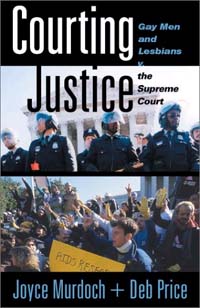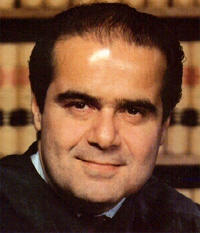 |


|
|
'Gods from a Machine' By Jesse Monteagudo
It is human nature to yearn for someone or something that would take care of our problems, without hesitation or compromise. In America the courts, with their unique powers of judicial review, have long served as "gods from a machine". Since judges do not answer to the passions and prejudices of a majority, minority groups look to the courts to make politically unpopular decisions. As frequent targets of popular referenda and initiatives, LGBT Americans may be forgiven for believing that it would be easier to convince a handful of judges as to the rightness of our case. We yearn for a LesBiGay and Trans equivalent of ^Roe v. Wade~ (1973), in which the United States Supreme Court cut through years of controversy and legalized abortion in this country.
Though conservatives condemn ^Roe v. Wade~ as the epitome of an activist judiciary going amok, it was actually the last hurrah of a liberal Court. In fact, ^Roe v. Wade~ did not solve the abortion issue. On the contrary, it energized the anti-choice movement and helped usher in the "pro-life" presidencies of Ronald Reagan and the two Bushes. According to Joyce Murdoch and Deb Price, authors of ^Courting Justice: Gay Men and Lesbians v. the Supreme Court ~(Basic Books), the queer experience with the Supremes has been far from ideal. For every pro-gay Supreme Court decision there have been at least two decisions that upheld antigay legislation or allowed individuals and groups (like the Boy Scouts) to discriminate with impunity.
 Though antigay rulings can be attributed to
judicial restraint or respect for the legislative process, the fact remains
that judges and justices can be as prejudiced as most Americans. Here the
worst culprits are not the outright bigots like Chief Justice Rehnquist or
Associate Justice Antonin Scalia -- who we can rely to rule against us anyway
- but well-meaning but ignorant magistrates whose decisions tip the scales of
justice against us. Justice Lewis Powell, whose vote in ^Bowers v. Hardwick ~
(1986) upheld state sodomy laws, claimed not to know any gay people even
though he employed a succession of gay (but closeted) law clerks. How
Powell's decision, and gay history, might have changed if one of his law
clerks had come out to him can only be imagined.
Though antigay rulings can be attributed to
judicial restraint or respect for the legislative process, the fact remains
that judges and justices can be as prejudiced as most Americans. Here the
worst culprits are not the outright bigots like Chief Justice Rehnquist or
Associate Justice Antonin Scalia -- who we can rely to rule against us anyway
- but well-meaning but ignorant magistrates whose decisions tip the scales of
justice against us. Justice Lewis Powell, whose vote in ^Bowers v. Hardwick ~
(1986) upheld state sodomy laws, claimed not to know any gay people even
though he employed a succession of gay (but closeted) law clerks. How
Powell's decision, and gay history, might have changed if one of his law
clerks had come out to him can only be imagined.
For years Florida activists have searched for the "perfect case" that would overturn a state law that prevents homosexuals from adopting children. This piece of legislation, passed in 1977 in response to the emerging gay rights movement, was a reflection of this state's "moral disapproval of homosexuality". A quarter of a century later, not much has changed as far as official Florida's attitudes towards homosexuality are concerned: the Legislature is, if anything, even more conservative; and Governor JEB is no friend of our community. Only in the courts, activists argued, would such an unjust statute be repealed. In Steven Lofton, Douglas Houghton and two other men, queer activists thought that we found the right plaintiffs and, perhaps, the "perfect case". Certainly the plaintiffs and their legal teams did the best they could, and they should be complimented for their efforts. Unfortunately for Lofton and Houghton and the rest of us, Federal Judge James Lawrence King upheld the Florida statute; and once again the "perfect case" is less-than perfect. Though King kindly rejected the State's "moral disapproval" argument, he agreed with the State's contention that it has a "legitimate interest" to deny the right to adopt to anyone it chooses. Ignoring the thousands of lesbian and gay men who are now raising children, King ruled that it is in a child's "best interest" to be raised in a home with a male father and a female mother. If gays want the State to abolish its antigay adoption law, Judge King seems to say, we will have to deal with state legislators who, to a great extent, do not think well of us. (Remember Allen Trovillion?) Perhaps there is not such thing as a "perfect case". If we want repressive laws to be abolished and our rights to be protected we will have to undertake the long and tedious process of educating the voting public and its representatives. For all our progress, lesbians, gay men, bisexuals and transgender people remain unpopular minorities in a country where majorities all-too often express their prejudices at the polls. This is why Florida, in spite of its large and active queer communities, has some of the most discriminatory laws in this country and why, even in "liberal" counties like Broward and Miami-Dade, our communities must still fight for our rights in the courts of public opinion.
|

© 1997-2002 BEI
 Justice Scalia: One of the gods affecting American and gay life today in America
Justice Scalia: One of the gods affecting American and gay life today in America  Jesse Monteagudo is a freelance writer who lives in South Florida with
his domestic partner. He can be reached at
Jesse Monteagudo is a freelance writer who lives in South Florida with
his domestic partner. He can be reached at